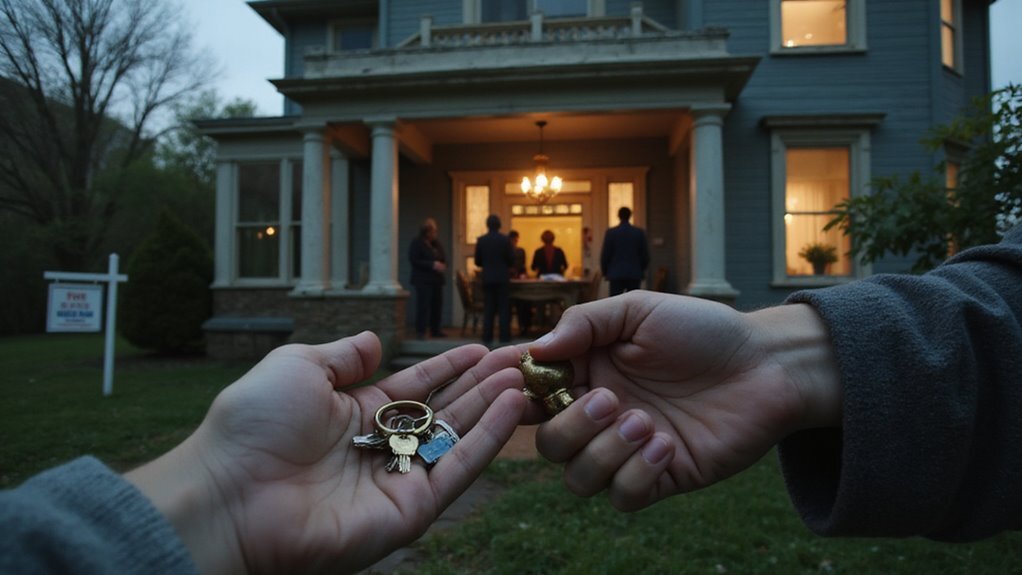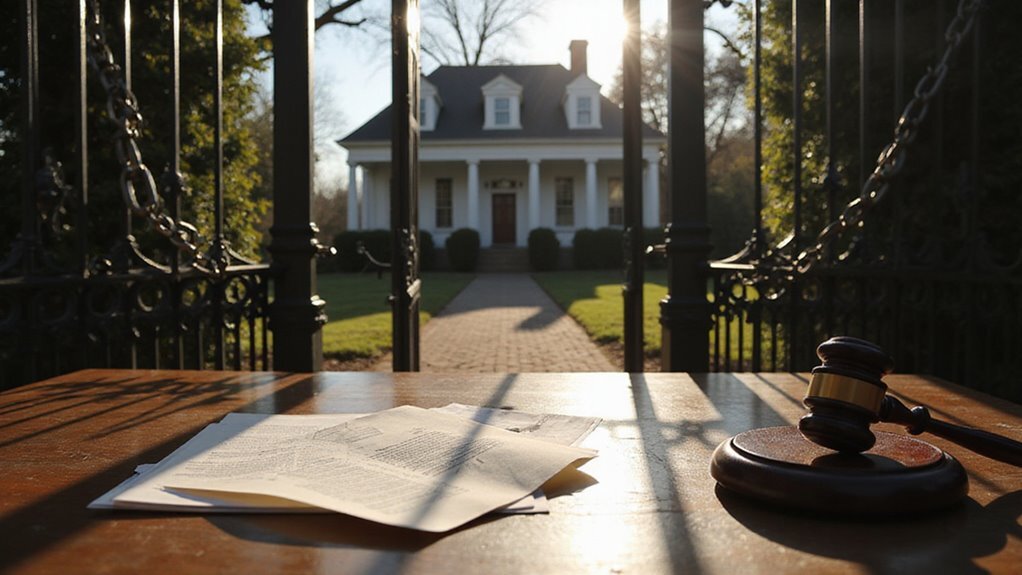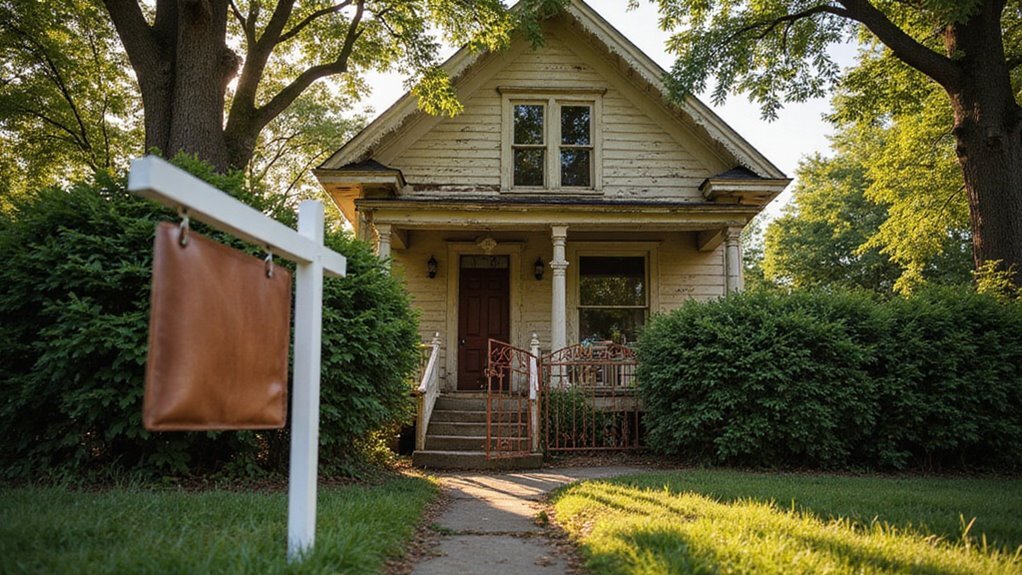Navigating property sales during probate feels like walking through a legal minefield for many heirs. Selling inherited property before probate completion creates significant risks for all parties involved. Rushing through the process without proper legal authority can lead to voided sales and costly legal battles. Fortunately, with correct guidance and court approval, heirs can navigate early property sales successfully.
While selling a house before probate completion is possible, it requires court approval and strict adherence to state laws. The estate must obtain proper legal authority through probate proceedings, notify all heirs, and follow specific procedures.
This blog will explore every aspect of selling inherited property before probate completion is finalized.
Key Takeaways
- Selling a house before probate completion generally requires court approval and proper legal authority as the estate’s executor.
- Florida law typically prohibits transferring property title before probate is finalized.
- Heirs cannot sell the property until the court grants permission and the executor or personal representative is authorized.
- Proper notification of all heirs and creditors is essential before any sale during probate.
- Working with legal professionals or companies like Greg Buys Houses ensures compliance and facilitates faster transactions within Florida laws.
Can You Sell a House Before Probate is Completed?

Selling a house before probate completion is rarely possible in Florida. Legal title must first transfer to the estate through proper probate proceedings. A personal representative needs court approval before any property sale can occur.
The process requires careful steps for success. A formal petition must be filed with the court to request permission for the sale. All heirs must receive proper notification about the intended property transaction. The court reviews these documents to protect beneficiary interests.
For peace of mind, wait until probate begins. Quick sales without legal authority can lead to problems later. Smart sellers follow proper procedures to ensure valid transactions.
What is Probate and Why Does it Matter?
Probate is the legal oversight of distributing a deceased person’s assets and settling their debts.
The court validates the will, appoints an executor, and supervises asset distribution according to state laws. This process protects both heirs and creditors from potential disputes or fraud. A judge ensures all legitimate claims get proper consideration.
Beyond asset distribution, probate matters because it provides clear legal title to property. Without probate completion, heirs cannot sell or transfer inherited real estate. Moreover, this process helps families avoid future legal complications.
As a result, proper probate compliance prevents voided transactions and unnecessary delays in estate settlement.
Can a House Be Sold During the Probate Process?

Yes, a house can be sold during probate with proper court approval. The court must approve any sale of property during the probate process. A personal representative needs legal authority to handle the transaction. The steps include filing a petition and notifying all heirs about the intended sale.
The sale proceeds help pay estate debts and expenses. Florida probate laws require strict adherence to prevent the sale from becoming void. Courts protect heir interests through oversight of these transactions.
An experienced probate attorney ensures compliance with legal requirements. The right guidance makes property sales smoother during estate settlement.
What Are Your Options for Selling During Probate?
You need to understand your options for selling a house during probate, as each path has specific requirements and risks. Whether it’s obtaining court approval through an executor sale, selling with limited authority, or reaching an agreement among heirs, timing is critical. Exploring these options quickly can save costs, prevent property loss, and ensure proper estate management.
Executor Sale with Court Approval
Court approval is required for executors to sell estate property during probate. A valid executor sale needs formal permission from the probate court before any transaction can proceed. The executor must file a petition, schedule a hearing, and notify all heirs and creditors.
Property sales serve to pay estate debts and distribute assets properly. A certified appraisal determines fair market value before the sale. The court reviews all documentation to protect involved parties’ interests.
The basic steps ensure transparency and legal compliance. Executors must submit detailed records of the sale proceeds and their planned distribution. Proper approval prevents future disputes and establishes a clear chain of title.
Selling with Limited Authority
Limited authority allows estate representatives to sell property with reduced court oversight. The probate court grants permission but maintains less direct supervision of the sale process. A personal representative can act more independently when liquidating assets.
Three main options exist for limited authority sales: court-approved transactions, unanimous heir agreements, and small estate procedures. The court must still approve major decisions but without extensive review requirements.
Each approach helps speed up probate while protecting heir interests. Representatives must follow state laws yet gain flexibility to complete sales efficiently. Proper documentation and transparency remain essential throughout the process.
Sale by Agreement Among Heirs
A sale by agreement among heirs allows multiple beneficiaries to sell inherited property together during probate. All heirs must provide written consent and follow specific court procedures to sell the property legally. The court requires proper documentation and fair market valuation before approving any sale. An agreement must include signatures from every heir and details about price, commissions, and closing costs.
Moreover, this approach can reduce delays and expenses compared to traditional probate sales. Smart coordination between heirs helps maximize the estate value. Local probate laws determine exact requirements and timeframes for completing the sale.
Utilizing the Small Estate Exception
The small estate exception helps executors bypass standard probate for faster property sales. Florida law allows this simplified process when an estate’s total value falls below $75,000. A small estate affidavit replaces full probate court proceedings.
To qualify, executors must meet specific requirements and file proper documentation. The estate must have no unpaid debts and all heirs must agree in writing. After that, property sales can proceed quickly.
This process reduces legal fees and paperwork for eligible estates. Nevertheless, executors should consult an attorney to ensure proper compliance with state regulations.
Working with Cash Buyers During Probate
Cash buyers can purchase probate properties through proper legal channels. The court must approve any probate sale before it can proceed. A valid property appraisal and formal petition must be submitted to the court.
The process protects all parties involved in the transaction. Heirs and creditors receive official notification about the proposed sale. This step maintains transparency throughout the process.
Moreover, cash sales move faster than traditional financing. Quick sales help preserve property value and settle estate debts promptly. Florida Probate Code guides all probate property transactions to ensure legal compliance.
How to Sell a House During the Probate Process?
To sell a house during probate, you must first secure court approval and legal authority as the executor. Next, get a professional appraisal, prepare the property for sale, and develop a marketing plan. Be ready to navigate court confirmation if required to ensure the sale complies with Florida law.
Obtaining Legal Authority as Executor
Legal authority comes through the official appointment as executor by a probate court. The court grants specific powers to manage and sell estate property. You must file a petition, submit asset inventories, and receive formal court approval.
Your first steps include notifying all heirs and creditors about the probate process. Florida law requires strict compliance with probate procedures and timelines. A court order confirms your role as executor.
Valid legal authority protects everyone’s interests and prevents future disputes. The estate sale can proceed smoothly once you obtain proper documentation. With this foundation in place, you can confidently handle property transactions.
Getting Property Appraisal and Valuation
A professional property appraiser must assess the estate’s value before any sale can proceed. Florida probate law requires certified appraisals for all estate property sales. A licensed appraiser examines the property condition, location, and market data to determine fair value.
Professional appraisals protect everyone involved by documenting the property’s true worth. The court relies on these valuations to approve sale prices and distribute assets fairly. Furthermore, accurate appraisals reduce the risk of future disputes between heirs.
Preparing the Property for Sale
A clean, well-maintained property attracts buyers and speeds up probate sales. Basic repairs, thorough cleaning, and simple staging create an appealing first impression. All maintenance tasks must be documented for court review.
Professional inspections identify issues before they become costly problems. Photos and detailed records help demonstrate proper care to the court. An official property appraisal establishes fair market value for probate purposes.
Moreover, clear communication keeps heirs informed and prevents misunderstandings. Regular property checks ensure no deterioration occurs during the probate process. The estate administrator should maintain receipts for all preparation expenses.
Marketing the Probate Property
Effective probate property marketing requires strategic promotion after receiving court approval. The property must reach both traditional buyers and real estate investors through multiple channels.
A professional realtor should list the property within 48 hours of court approval. Online listings on major real estate websites expand visibility to potential buyers. Regular open houses allow interested parties to view the property firsthand.
Most importantly, clear disclosures about the probate status protect all parties involved in the transaction. Furthermore, targeted outreach to local real estate investment groups can speed up the sale process. Legal documents and property condition reports must accompany all marketing materials.
Navigating Court Confirmation When Required
Court confirmation requires specific steps and timelines to get approval for a probate property sale. The court must review and approve all sale documents before finalizing any probate property transaction. A judge examines the purchase agreement, appraisals, and notices during a formal hearing. Notices must be sent to all interested parties at least 15 days before the hearing date.
Your attorney should prepare clear documentation and address concerns from heirs or creditors quickly. Most courts require overbidding at confirmation hearings, which can increase the final sale price by 5-10%. This process protects the estate’s interests through proper oversight.
Finalizing the Sale and Distribution
A complete estate sale requires court approval and proper distribution of assets to heirs. The probate court must authorize any sale of estate property before proceeding with transactions. All estate debts and expenses need payment before asset distribution can occur.
The executor must coordinate with legal teams to manage the sale process effectively. Most states require court confirmation hearings or competitive bidding for estate sales. Clear documentation helps prevent future disputes among beneficiaries.
Once approved, proper asset distribution safeguards everyone’s interests. Heirs receive their designated portions after deducting necessary fees and expenses. The court validates final disbursements to close the probate case officially.
What Are the Legal Implications and Restrictions?

You need to know that Florida law strictly controls how and when you can sell a house before probate is complete. Failing to follow state-specific probate rules can lead to legal challenges, rejected sales, or even voided transactions. Plus, ignoring significant tax consequences and creditor claims can cause serious financial and legal trouble down the line.
State-Specific Probate Laws
Each state maintains unique probate laws that regulate property sales during estate settlement. Courts must approve most real estate transactions before probate completion. A property sale requires proper notification to heirs and estate creditors.
Legal compliance protects everyone involved in the transaction. Smart executors verify local rules before listing any property. Moreover, proper documentation helps avoid costly delays or disputes.
All estate debts and expenses need payment before property distribution can occur. The executor must follow state-mandated procedures and timelines. Subsequently, careful attention to legal requirements ensures smooth, valid property transfers.
Potential Tax Consequences
Capital gains taxes apply when an estate property sells. The tax calculation uses the property’s fair market value on the date of death. Heirs must pay taxes on any profit above this stepped-up basis amount.
A tax advisor should review the timing and terms of property sales. Quick sales before probate completion may create extra tax complications. The IRS requires specific documentation and forms to report estate property sales.
Tax planning helps preserve more inheritance money for beneficiaries. Professional guidance ensures proper reporting and minimal tax burden. Your estate can save thousands through strategic timing of property transactions.
Creditor Claim Considerations
Creditor claims must be fully resolved before selling property in probate. A valid estate sale requires proper notification to all creditors and settlement of outstanding debts. Florida law mandates court approval for managing creditor claims during probate.
Proper handling protects the sale from future disputes. The estate must pay valid claims according to legal priority levels. Creditors have up to 2 years to contest an estate distribution if not properly notified.
A clear creditor settlement plan prevents costly delays and legal issues. Each claim needs careful review and documentation. This proactive approach supports smooth property transfers and protects all parties involved.
What Are the Benefits of Selling Before Probate Completes?

Selling the property before probate finishes can save you from ongoing expenses like taxes and maintenance costs. It also speeds up how quickly assets reach heirs, avoiding delays and legal complications. Plus, you can get immediate cash to cover estate bills and prevent the property from falling into disrepair.
Avoiding Ongoing Property Expenses
Quick property sales minimize ongoing estate expenses and protect asset value. Estate administrators must sell real estate after receiving court approval to prevent mounting costs. A fast sale avoids continuous property taxes, insurance premiums, and maintenance fees.
The property also stays protected from deterioration and security risks. Real estate that sits vacant becomes vulnerable to vandalism, weather damage, and declining market values. Prompt action preserves the property’s worth.
Moreover, available funds help settle outstanding debts faster. Early sales allow heirs to receive their inheritances sooner. This approach serves everyone’s interests while maintaining the estate’s financial health.
Faster Distribution to Heirs
A property sale during probate lets heirs receive their inheritance faster than waiting until probate ends. The executor must obtain court approval before selling any estate property under Florida law. The sale helps pay estate debts quickly.
Quick liquidation prevents property value loss and maintenance costs. Early distribution provides immediate financial support to beneficiaries. Small estate procedures or limited authority sales can speed up the process.
Clear estate debts and expenses promptly benefit everyone involved. In addition, heirs can move forward with their plans sooner. The property stays in better condition through a timely sale.
Reduced Administrative Burden
A pre-probate property sale reduces paperwork and simplifies estate administration tasks. The executor can complete all required documentation in one streamlined process instead of multiple court filings. Legal fees and administrative costs decrease substantially with an early property sale.
The estate closes faster when executors handle property transactions before final probate settlement. This approach prevents property maintenance headaches and deterioration risks. Communication with heirs becomes more straightforward with fewer ongoing updates needed.
Moreover, quick asset distribution benefits all parties involved. The process requires less court oversight and fewer formal procedures. A proactive sale protects the property’s value while serving the estate’s interests efficiently.
Preventing Property Deterioration
Quick property sales protect against deterioration and vandalism in vacant homes during probate. Empty houses face major risks from weather damage, theft, and general decay. Properties left vacant for over 30 days show visible signs of neglect and lose 10-15% of their value. A prompt sale helps maintain the home’s condition and market worth.
Moreover, secure properties require less maintenance and insurance costs. The estate benefits from reduced expenses while preserving asset value for heirs. Fast action prevents costly repairs and protects the inheritance.
Immediate Cash Flow for Estate Expenses
Quick estate sales provide essential cash for urgent expenses like taxes, debts, and maintenance costs. A probate property sale lets you access funds before the full probate process finishes. The court must approve this type of early sale.
Estate bills often include funeral costs, property taxes, and outstanding debts that must be paid within specific timeframes. Money from a fast sale prevents late fees and property damage. The estate can maintain its value while reducing storage and upkeep expenses.
Clear benefits help heirs receive their inheritance sooner. Your estate stays protected through proper legal channels. A swift sale creates financial stability during a challenging time.
Conclusion
Selling a house during probate requires careful navigation of legal requirements and proper timing. The process can move forward with court approval and the right professional guidance. Working with experienced buyers can help streamline the complicated probate sale process.
At Greg Buys Houses, we understand the challenges of selling properties during probate in Pensacola and surrounding Florida areas. We help heirs navigate through complex probate sales with our extensive experience. Our team works directly with executors and administrators to ensure compliance with all legal requirements. We can provide quick, cash offers that align with probate court timelines.
Working with us eliminates many common obstacles in probate property sales. We handle properties in any condition throughout Pensacola FL and nearby Florida cities. Our process simplifies the transaction while ensuring all legal requirements are met. We work closely with probate attorneys to facilitate smooth, compliant property transfers.

